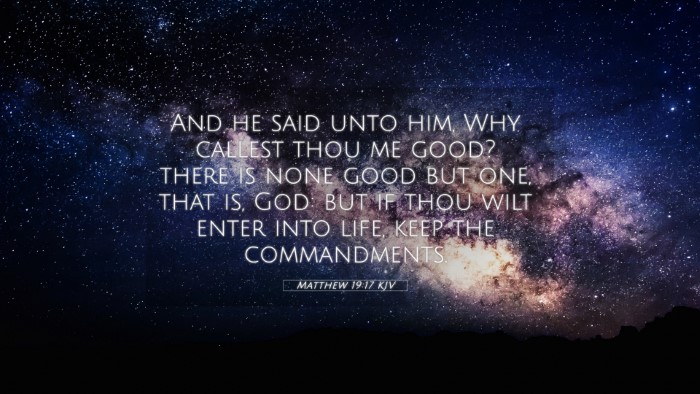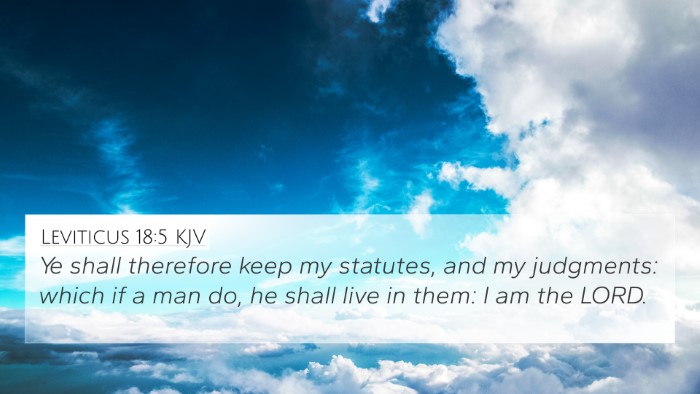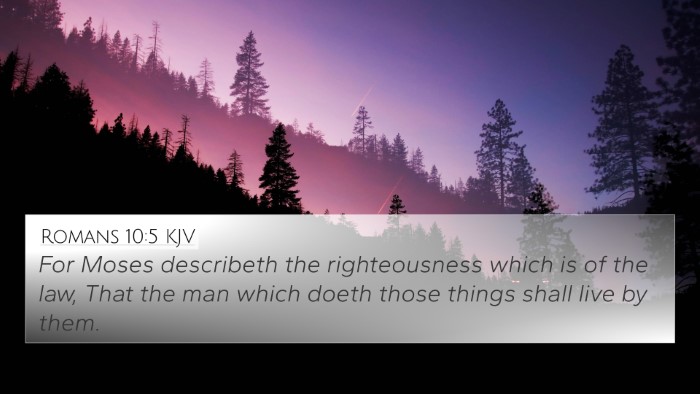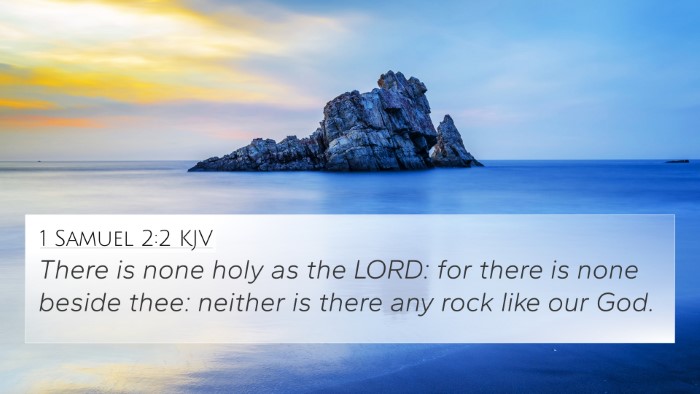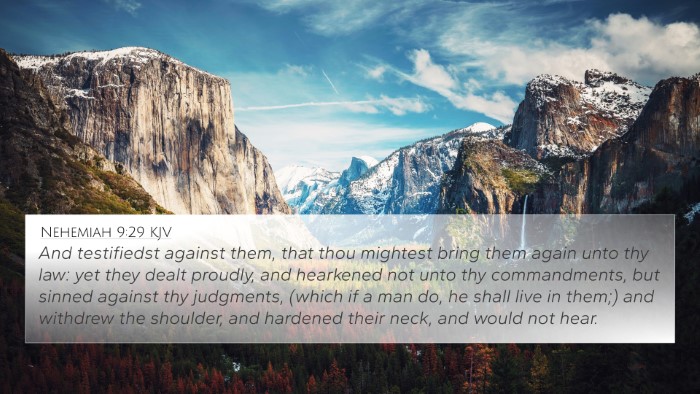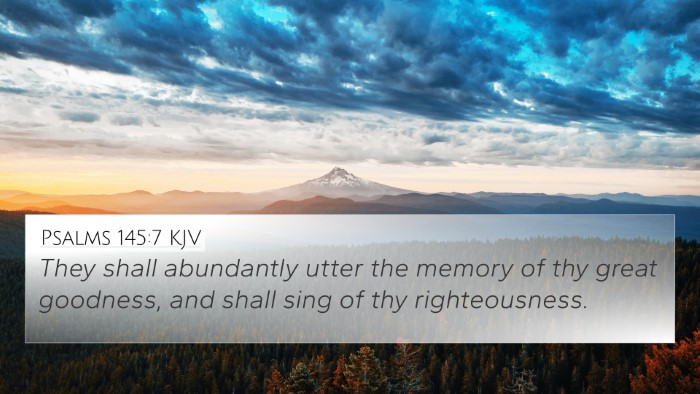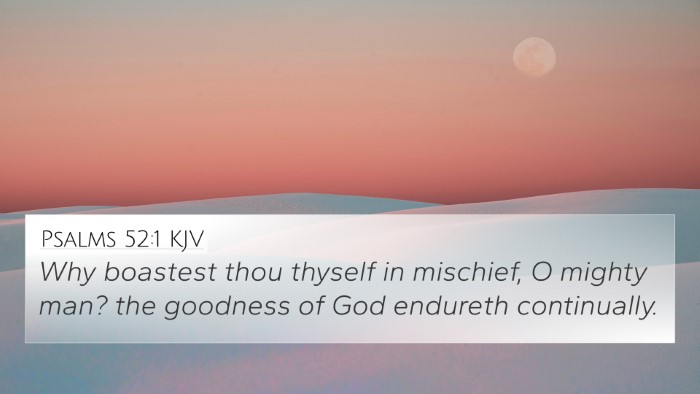Understanding Matthew 19:17
Verse: “And he said unto him, Why callest thou me good? there is none good but one, that is, God: but if thou wilt enter into life, keep the commandments.” (Matthew 19:17)
Summary of Meaning
Matthew 19:17 presents an essential dialogue between Jesus and a wealthy young ruler who seeks eternal life. This interaction reveals profound theological insights regarding goodness, the nature of God, and the conditions for inheriting eternal life.
Insights from Public Domain Commentaries
- Matthew Henry:
Henry explains that Jesus' question about His goodness is to redirect the young ruler’s perception of goodness towards God alone. The essence of this verse emphasizes that no one is inherently good apart from God, underscoring the divine nature and moral perfection of God as the sole standard of goodness.
- Albert Barnes:
Barnes elaborates on the aspect of keeping the commandments as a prerequisite for eternal life. He asserts that Jesus is not dismissing His goodness but is highlighting the need for obedience to God's law as the means of relational integrity with God, suggesting that this obedience reflects genuine faith and commitment.
- Adam Clarke:
Clarke focuses on the distinction made by Jesus between human goodness and divine goodness. He interprets the statements to mean that while humans can reflect God's goodness, they cannot possess it in its fullness. Clarke points out that Jesus' assertion emphasizes a person’s need for divine grace and adherence to God's commandments to attain eternal life.
Cross-References and Thematic Connections
Matthew 19:17 connects with several other Bible verses that enhance understanding through thematic links and comparative analysis:
- Mark 10:18: “And Jesus said unto him, Why callest thou me good? there is none good but one, that is, God.” – This parallel verse reinforces the notion of God's unique goodness.
- Luke 18:19: “And Jesus said unto him, Why callest thou me good? none is good, save one, that is, God.” – Similar to Mark's account, this further demonstrates the consistency in Jesus' teaching about divine goodness.
- Romans 3:10: “As it is written, There is none righteous, no, not one:” – This underscores the universal need for God’s righteousness and the human condition of sin.
- Galatians 2:16: “Knowing that a man is not justified by the works of the law, but by the faith of Jesus Christ...” – This highlights the theme of faith over mere law-keeping for salvation.
- John 14:6: “Jesus saith unto him, I am the way, the truth, and the life: no man cometh unto the Father, but by me.” – This asserts that Jesus is the pathway to eternal life, which complements the inquiry made by the rich ruler.
- 1 John 2:3-4: “And hereby we do know that we know him, if we keep his commandments. He that saith, I know him, and keepeth not his commandments, is a liar, and the truth is not in him.” – This reinforces the idea of obedience being a marker of genuine faith.
- Matthew 5:19: “Whosoever therefore shall break one of these least commandments, and shall teach men so, he shall be called the least in the kingdom of heaven...” – Tie to the necessity of upholding commandments for those who aspire toward the kingdom.
Comparative Bible Verse Analysis
This verse can be analyzed in light of its implications on the concept of goodness, human abilities, and divine requirements for salvation:
- Human vs. Divine Goodness: While humans can strive for goodness, the intrinsic nature of goodness resides only in God, prompting believers to seek divine assistance in moral living.
- Law versus Grace: The tension between adherents to the law and reliance on grace is significant in understanding Christian salvation. This prompts inquiry into how obedience complements faith.
- Obedience as Evidence of Faith: The connection between faith and works emphasizes that genuine faith must manifest in obedience, arising from a relationship with God, not out of legalistic obligation.
How to Use Bible Cross-References
Finding cross-references in the Bible involves utilizing tools such as a Bible concordance, thematic study guides, and organized scripture by theme:
- Study Bibles with Cross-References: These often include marginal notes that indicate connecting verses.
- Bible Apps: Most modern Bible applications allow users to search and see connections quickly.
- Bible Commentaries: Incorporating insights from well-respected commentaries can deepen understanding and reveal hidden connections between scriptures.
Conclusion
Matthew 19:17 encapsulates critical theological concepts surrounding goodness, obedience, and the path to eternal life. Engaging with this verse through cross-referencing enhances the understanding of its application and consistency within the broader biblical text. By connecting it with other scriptures, believers can gain valuable insights into the nature of God, the human condition, and the pathway to fulfillment in faith.
As you explore the links between Bible verses, remember that each connection serves to deepen your understanding of God's revelation and guidance. Engage with scripture through prayerful study, and allow the Holy Spirit to illuminate the truths found in God’s Word.

